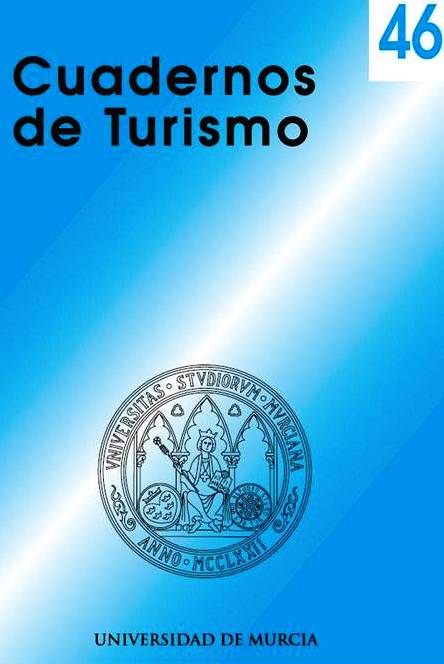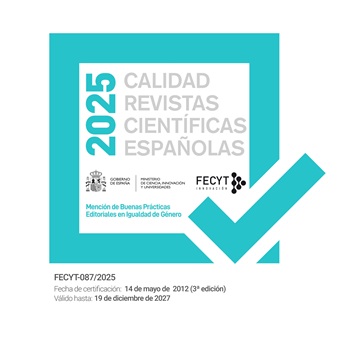MARINE TOURISM AS AN OPTION FOR SUSTAINABLE LOCAL DEVELOPMENT BASED ON FEMALE EMPOWERMENT
Abstract
Marine tourism has become a tourist reference with more than two decades of international expansion and continuous growth. In this context, the present work aims to study marine tourism as an option for sustainable local development through female empowerment. The study has been based on semi-structured interviews with women who lead marine tourism projects in Galicia and on a content analysis of the news on the treatment that the press gives them. The results show that most of the projects are innovative, diversified, participatory and responsible. It is found that, despite the evident progress, it is necessary to further promote female entrepreneurship in the field of marine tourism, in addition to promoting their presence and social projection through the media.
Downloads
-
Abstract1894
-
PDF (Español (España))1889
-
PDF1889
References
ABRAHAMSSON, A. (2008): «Sustainopreneurship –business with a cause: the promise of creative business organizing for sustainability», en Johannisson y Lindholm Dahlstrand (Eds.), Bridging the functional and territorial views on regional entrepreneurship and development. Sweden, Swedish Foundation for Small Business Research, pp. 137-155.
ALARIO TRIGUEROS, M. y MORALES PRIETO, E. (2016): «Iniciativas de las mujeres: emprendimiento y oportunidades en el espacio rural de Castilla y León», Documents d' Anàlisi Geogràfica, vol. 62 (3), pp. 613-637.
ALEGRET, J.L. (2013): «Del patrimonio natural de los peces al patrimonio cultural del pescado: el espai del peix de palamos», Revista Andaluza de Antropología, nº 4, pp. 33-54.
ATLAS.TI (8.1.3) (2020). Disponible en: https://atlasti.com/es/
BESTEIRO, B. (2004): «El desarrollo del turismo náutico en Galicia», Cuadernos de Turismo, nº 13, pp. 145-163.
BROULLÓN, ESMERALDA (2010): «Culturas marítimas y relaciones de poder. La trayectoria el marisqueo a pie en las Rías Bajas gallegas», Cuadernos de Estudios Gallegos, nº 123, pp. 375-399.
CENTRO TECNOLÓGICO DEL MAR (CETMAR) (2010): La pesca de bajura: situación en 2007 y perspectivas para una orientación sostenible. Recopilación de estudios realizados por el proyecto SEREA. Ed. CETMAR. Pontevedra.
CHEK SULAIMAN, F., JAINI, N., ROUZEE JAMALUDDIN, E. e IDZHAINEE HASHIM, N. (2018): «The impact of marine tourism towards the local community at Palau Pangkor, Perak». Asian Journal of Quality of Life, vol. 3 (13), pp. 168-176.
CHEN, C. (2010): «Diversifying fisheries into tourism in Taiwan: experiences and prospects», Ocean & Coastal Management, vol. 53 (8), pp. 487-492.
DATTA, P.B. y GAILEY, R. (2012): «Empowering women through social entrepreneurship: Case study of a women’s cooperative in India», Entrepreneurship Theory and Practice, vol. 36 (3), pp. 569-587.
FACTIVA (Bases de datos de prensa). Disponible en: http://www.factiva.com
FARNET (2011): «Guía 5 Diversificación de las zonas de pesca». Disponible en: https://www.mapa.gob.es/es/pesca/temas/diversificacion/analisisecononomicodeladiversifiacionpesquerayacuicola_tcm30-290383.pdf
FARNET (2013): «Uniendo la pesca con la economía del turismo». Disponible en: https://webgate.ec.europa.eu/fpfis/cms/farnet/files/documents/FARNET_Magazine_09_ES_0.pdf
FERNÁNDEZ HERNÁNDEZ, C. (2020): «Astroturismo rural: nuevas experiencias en tiempos pos-COVID», en Simancas, M., Hernández R. y Padrón, N. (Coords.) Turismo pos-COVID-19. Reflexiones, retos y oportunidades. La Laguna, Cátedra de Turismo CajaCanarias-Ashotel de la Universidad de La Laguna, pp. 535-543.
FUENTES GARCÍA, F.J. y SÁNCHEZ CAÑIZARES, S.M. (2010): «Análisis del perfil emprendedor: una perspectiva de género», Estudios de Economía Aplicada, vol. 28 (3), pp. 1-28.
GARCÍA NEGRO, M.C. y ZOTES, Y.N. (2006): «El trabajo de las mujeres en el sector pesquero gallego. Análisis de los problemas relacionados con su tratamiento estadístico». Revista Galega de Economía, vol. 15 (1), pp. 1-25
GESSA PERERA, A. y TOLEDANO (2011): «Turismo, emprendimiento y sostenibilidad en los espacios naturales protegidos. El caso de Andalucía (España)», Estudios y Perspectivas en Turismo, vol. 20 (5), pp. 1.154-1.174.
GRÀCIA, F. (2016): «El turisme pesquer», en Sánchez, J.LL. (Ed.) La pesca a la Mediterrània. Alicante, Universidad de Alicante, pp. 123-126.
HERRERA-RACIONERO, P., MIRET-PASTOR, L. y LIZCANO, E. (2018): «Viajar con la tradición: los pescadores artesanales ante la pesca-turismo en la Comunidad Valenciana (España)», Cuadernos de Turismo, nº 41, pp. 279-293.
HOWARD, P. y PINDER, D., 2003: «Cultural heritage and sustainability in the coastal zone: experiences in south west England», Journal of Cultural Heritage, vol. 4 (1), pp. 57-68.
JIMÉNEZ DE MADARIAGA, C. y GARCÍA DEL HOYO, J.J. (2018): «Enhancing of the cultural fishing heritage and the development of tourism: A case study in Isla Cristina (Spain)», Ocean & Coastal Management, vol. 168, pp. 1-11.
KHAKZAD, S. (2018): «Promoting coastal communities through cultural tourism: the case of fishing communities in Brunswick Country, North Carolina», Journal of Heritage Tourism, vol. 13 (5), pp. 455-471.
KHAKZAD, S. y GRIFFITH, D. (2016): «The role of fishing material culture in communities´sense of place as an added-value in management of coastal areas», Journal of Marine and Island Cultures, vol. 5 (2), pp. 95-117.
KIMBU, A.N. y NGOASONG, M.Z. (2016): «Women as vectors of social entrepreneurship», Annals of Tourism Research, vol. 60 (1), pp. 63-79.
LA VOZ DE GALICIA (27/08/2018): «Turismo marinero, la otra industria del mar que ya suelta amarras». Disponible en: https://www.lavozdegalicia.es/noticia/mercados/2018/08/26/turismo-marinero-industria-mar-suelta-amarras/0003_201808SM26P6992.htm.
Ley 33/2014 de 26 de diciembre por la que se modifica la Ley 3/2001 de 26 de marzo, de Pesca Marítima del Estado Español
LING CHEN, C. y CHIAO CHANG, Y. (2017). «A transition beyond traditional fisheries: Taiwan's experience with developing fishing tourism», Marine Policy, vol. 79, pp. 84-91.
LORENZO, A. y MARTÍNEZ, M. (2003): «Condiciones y experiencias de participación en la Galicia rural», en Encina J. et al., (Coords.) Praxis participativa desde el medio rural. Madrid, Iepala Editorial-Cimas, pp. 301-320.
MARTÍNEZ GARCÍA, P. (2017): «Mirando al mar desde los feminismos. Comunidad y supervivencia en torno a las trabajadoras de la pesca». Prima social, 19, pp. 183-214.
MARTÍNEZ-GARCÍA, P. (2019). «Cuando las mujeres acceden al poder. discriminaciones y resistencias en las comunidades marineras», Feminismo/s, nº 33, pp. 171-196.
MARTÍNEZ, C. y MORENO, D. (2013): «La pesca como recurso turístico en Mazarrón (Murcia)». Estudios Turísticos, nº 196, pp. 113-134.
MARTÍNEZ, C. y MORENO, D. (2014): Turismo marinero en Mazarrón: experiencia y futuro. Mazarrón, Ayuntamiento de Mazarrón.
MIRET-PASTOR, L., MOLINA-GARCÍA, A., GARCÍA-ARANDA, C. y HERRERA-RACIONERO, P. (2018): «Analysis of the fisheries diversification funds in Spain during the period 2007-2014», Marine Policy, vol. 93, pp. 150-158.
MIRET-PASTOR, L.; MUÑOZ ZAMORA, C., HERRERA-RACIONERO, P. y MARTÍNEZ NOVO, R. (2015): «Análisis regional del turismo pesquero en España», Revista de Análisis Turístico, vol. 20 (2), pp. 22-38.
MOLINA, A. GONZÁLEZ, J.F. y GARCÍA, C. (2010): «El turismo pesquero como instrumento de apoyo al desarrollo sostenible en zonas litorales: la experiencia del proyecto Sagital». Madrid, XIV International Congress on Project Engineering.
MORENO MUÑOZ, D. (2018a): La actividad pesquera en la Bahía de Mazarrón y el turismo marinero como propuesta de desarrollo. Tesis Doctoral. Universidad de Murcia.
MORENO MUÑOZ, D. (2018b): «Aportación a los conceptos de turismo marinero/pesquero y pesca-turismo”, Cuadernos de Turismo, nº 42, pp. 385-396.
MORENO MUÑOZ, D. y GARCÍA MARÍN, R. (2019): «El declive del sector pesquero en el Sureste de la Península Ibérica y el turismo marinero como propuesta de desarrollo», en Working Paper de la Red WATERLAT-GOBACIT dedicado a Pesca artesanal y patrimonio cultural: conflictos territoriales, resistencias y transformación social en Colombia, España y México, 6 (1), pp. 9-28.
MORENO MUÑOZ, D., GARCÍA MARÍN, R. y ESPEJO MARÍN, C. (2016): «Propuesta de turismo marinero en Mazarrón a raíz del Proyecto MARIMED. “La pesca como factor de desarrollo sostenible”», en Santos, X.M., Taboada, P. y López, L. (Eds.) Actas del X Congreso Internacional de Turismo Rural y Desarrollo Sostenible. Santiago de Compostela, Universidad de Santiago de Compostela, pp. 421-432.
MOVONO A. y DAHLES, H. (2017): «Female empowerment and tourism: a focus on businesses in a Fijian village». Asia Pacific Journal of Tourism Research, vol. 22 (6), pp. 681-692.
NADEL-KLEIN, J., (2000): «Granny baited the lines: perpetual crisis and the changing role of women in scottish fishing communities», Wom. Stud. Int. Forum, vol. 23 (3), pp. 363- 372.
ORGANIZACIÓN MUNDIAL DEL TURISMO (2011): Global report on women in tourism 2010. Madrid, World Tourism Organization.
OSUNA-RODRÍGUEZ, M., RODRÍGUEZ GARCÍA, L. y GÓMEZ PARRA, M. (2015): «Mujeres, Turismo Rural y Brecha Salarial de Género». Córdoba, Universidad de Córdoba.
PADÍN FABEIRO, C. y ABOY GARCÍA, S. (2010): «Nuevos productos turísticos: la apuesta por el turismo marinero en Galicia», Revista de Estudos Politécnicos, vol. 8 (14), pp. 55-83.
PADÍN, C., LIMA, C. y PARDELLAS, X.X. (2016): «A market analysis for improving fishing tourism management in Galicia (Spain)», Ocean and Coastal Management, vol. 130, pp. 172-178.
PARDELLAS, X. y PADÍN C. (2013): «Nueva demanda combinada de turismo litoral y turismo pesquero: motivaciones y efectos», Cuadernos de Turismo, nº 32, pp. 243-258.
PARDELLAS, X., PADÍN, C. y ABOY, S. (2011): «Turismo pesquero: experiencias en Europa y España», Papeles de Economía Española, nº 128, pp. 221-228.
PARDELLAS, X.X. y ESPEJO, C. (2013): «Turismo pesquero», en Solsona, X. y Pardellas, X.X. (Dirs.) La actividad turística española en 2012. Madrid, Editorial Universitaria Ramón Areces, pp. 433-440.
PATIÑO ROMARÍS, C.A. (2016): «El turismo marinero: un producto diferenciador y emergente de la oferta turística del litoral gallego», En Santos, X.M., Taboada, P. y López, L. (Eds.) Actas del X Congreso Internacional de Turismo Rural y Desarrollo Sostenible. Santiago de Compostela, Universidad de Santiago de Compostela, pp. 401-410.
PÉREZ CABRERA, A.M., TALLÓN FERNÁNDEZ, M.D., RODRÍGUEZ GUTIÉRREZ, P., y GUERRERO BAENA, M.D. (2017): «Estudio de la mujer emprendedora. El medio rural como oportunidad», RA & DEM: Revista de Administración y Dirección de empresas, nº 1, pp. 1-12
PÉREZ PIERNAS, P. y ESPEJO MARÍN, C. (2012): «La pesca como factor de desarrollo del turismo sostenible. El caso de Águilas (Murcia)», Cuadernos de Turismo, nº 30, pp. 267-284.
PROYECTO SAGITAL (2017): «El papel de la mujer en el sector pesquero: potencialidades en el ámbito del turismo pesquero». Madrid, Fundación General de la Universidad Politécnica de Madrid. Disponible en: http://www.cesmuamfar.com/pdf/El_Papel_de_la_Mujer_en_el_Sector_Pesquero._Potencialidades_en_el_%C3%A1mbito_tur%C3%ADstico-pesquero.pdf
RED ESPAÑOLA DE MUJERES EN EL SECTOR PESQUERO (REMSP) (2017): La igualdad en cifras: Diagnóstico sobre la situación de la mujer en el sector pesquero y acuícola. Madrid, Ministerio de Agricultura y Pesca, Alimentación y Medio Ambiente. Disponible en: https://www.mapa.gob.es/es/pesca/temas/red-
RICO GONZÁLEZ, M. y GÓMEZ GARCÍA, M.J. (2009): «La participación empresarial de la mujer en las iniciativas de turismo rural en Castilla y León», Economía Agraria y Recursos Naturales, vol. 9 (2), pp. 51-77.
ROGELJA, N. y JANKO, A. (2017): «How authentic is fishing tourism in Slovenia?», en Rogelja, N. y Janko, A. (Eds.) Fish on the Move. Cham, Suiza, Springer International Publishing, pp. 145-170.
SOLVOLL, G., ALSOS A. y BULANOVA, O. (2015): «Tourism entrepreneurship: review and future directions», Scandinavian Journal of Hospitality Tourism, vol. 15, nº supl. 1, pp. 120-137.
VARGAS SÁNCHEZ, A. (2020): «Entender el turismo post-coronavirus: posibles escenarios», en Bauzá, F.J. y Melgosa, F.J. (Coords.) El turismo después de la pandemia global. Análisis, perspectivas y vías de recuperación. Asociación Española de Expertos Científicos en Turismo. pp 7-19
WANG, N. (1999): «Rethinking Authenticity in Tourism Experience», Annals of Tourism Research, vol. 26 (2), pp. 349-370.
Las obras que se publican en esta revista están sujetas a los siguientes términos:
1. El Servicio de Publicaciones de la Universidad de Murcia (la editorial) conserva los derechos patrimoniales (copyright) de las obras publicadas, y favorece y permite la reutilización de las mismas bajo la licencia de uso indicada en el punto 2.
2. Las obras se publican en la edición electrónica de la revista bajo una licencia Creative Commons Reconocimiento-NoComercial-SinObraDerivada 3.0 España (texto legal). Se pueden copiar, usar, difundir, transmitir y exponer públicamente, siempre que: i) se cite la autoría y la fuente original de su publicación (revista, editorial y URL de la obra); ii) no se usen para fines comerciales; iii) se mencione la existencia y especificaciones de esta licencia de uso.
3. Condiciones de auto-archivo. Se permite y se anima a los autores a difundir electrónicamente las versiones pre-print (versión antes de ser evaluada) y/o post-print (versión evaluada y aceptada para su publicación) de sus obras antes de su publicación, ya que favorece su circulación y difusión más temprana y con ello un posible aumento en su citación y alcance entre la comunidad académica. Color RoMEO: verde.





_.jpg)








